Chinese mythology has some of the most astonishing folklore. From the fearsome dragons with the ability to control the oceans and all creatures within, to the gods and goddesses who have created all of humanity. Today we will dive into the fascinating world of Chinese mythology and explore the myths of the three creation gods.
What is Chinese mythology?
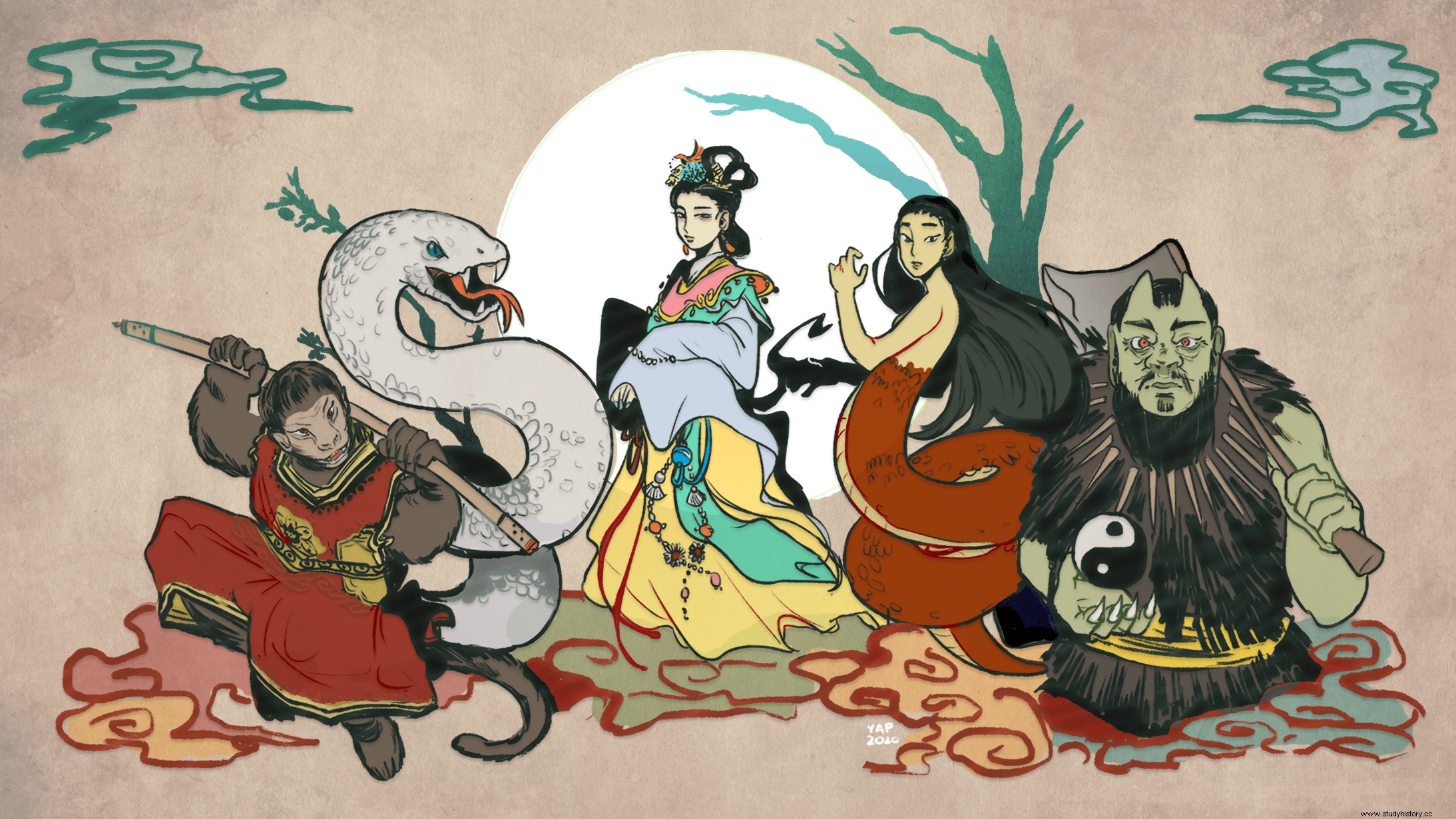
Chinese mythology is the collection of cultural history, folk tales and religious tradition that has been inherited for over four thousand years. These stories will be told either orally or in writing. Chinese mythology features legends and myths the creation, founding of Chinese culture and the Chinese state. Furthermore, it often informs people about moral issues, their culture and values.
The History of Chinese Mythology
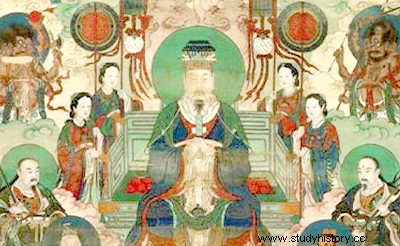
Chinese myths are believed to have originated around the 12th century BC. Myth and reality have both been intertwined throughout Chinese history. For this reason, historical figures have been worshiped as gods and ancient myths are treated as historical truths. Moreover, these myths have been shaped by three major religious traditions. They are known as Confucianism, Taoism and Buddhism. Out of these cultures arose myths about almighty gods, spirits and other deities. Chinese mythology actually contains over 200 gods.
Pangu
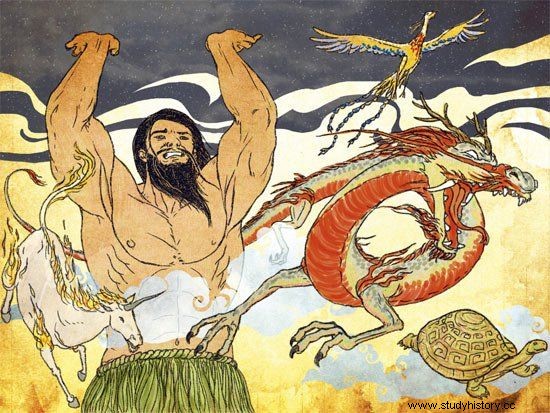
Pangu is an ancient Chinese deity known to be the first living being and creator of the world. When he came out of an egg, the whole cosmos was also liberated. His story serves as an explanation for the creation of the universe.
As one of the oldest myths in existence, Pangu's history has many variations. Individuals mostly told the story orally for many years until the Three Kingdoms period came. Xu Zheng, an ancient Chinese writer and official, was the first to write it down. Although there are many versions of the myth, there are three variants that prove to be the most common.
Egg
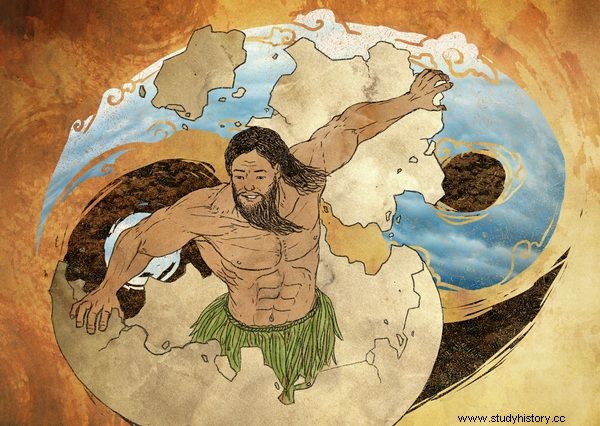
At first it was nothing but chaotic darkness. Over the course of 18,000 XNUMX years, the chaos swirled and gathered until it formed an egg. The shell had now confined the entire universe to this small space. The content just got more turbulent and stormier. The forces of Yin and Yang fought constantly, until one day they finally achieved balance. Pangu was born from this first union of Yin and Yang.
When he realized that he was stuck in a small room with little room for any movement at all, he began to twist and turn. This led to the egg splitting into two halves. The light and airy egg whites leaked out and floated upwards, forming the clouds and the sky. At the same time, the heavy and dense egg yolk sank and formed the soil. Eventually the two halves of the eggshells rose, one became the sun, and the other became the moon.
Pangu Raises the Heaven
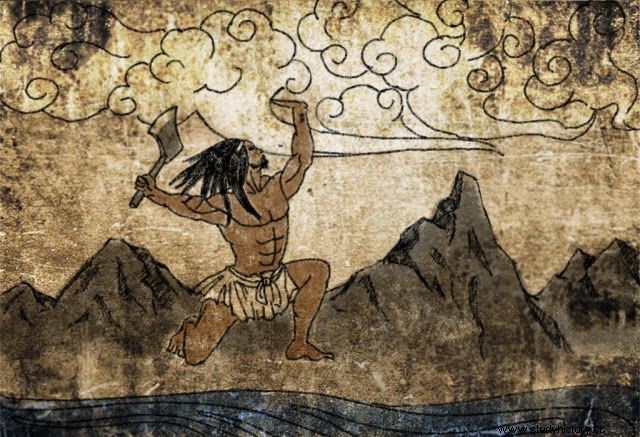
After the forces of Yin and Yang were united, Pangu found himself trapped in an egg. He took his big ax and used it to break open the shell. In the process, he cuts Yin and Yang in the middle, separating them. The stars and planets burst from the egg. Yin and Yang were separated, Yin formed the earth and Yang formed the sky above.
Pangu devoted his life to keeping Yin and Yang apart so that he would not be stuck between earth and heaven. He used his arms to hold up the sky. For each day his legs became three feet taller, and the ground became ten feet thicker. This continued for 18,000 XNUMX years until the day he died. As he passed, his four limbs became the pillars that hold the earth and the sky far apart as they are today.
Pangu's body becomes the earth
In the third most common myth, Pangu was so exhausted after breaking out of the egg that he took a nap and died asleep.
As his body decayed, it changed dramatically. His last breath rose and became the clouds. Soon after, the left eye floated up and became the sun, while the right eye became the moon. The flesh of his body melted off his bones and became rich soil. His spine became a large mountain range. Pangus' arteries became ravines and ravines, while his blood was to be the water that filled them. His hair fell off his head and drifted to become stars. His teeth and bones became metal and stones. Pangu's limbs became the pillars that separated heaven and earth.
Influence on pop culture
Pangu is not as popular as other deities due to the lack of children. Ancestor worship is, after all, an important aspect of Chinese culture, and Pangu has no descendants. Nevertheless, he is still a beloved deity, seen as benevolent and innocent. The Chinese even hold a festival to celebrate him every year at the Pangu King Temple, in Guangdong Province.
The Pangu team, a Chinese programming team known for developing a jailbreaking tool for Apple devices, chose its name in honor of the world's first living creature. The Chinese god is also in the video game Age of Mythology:Titan .
Nuwa
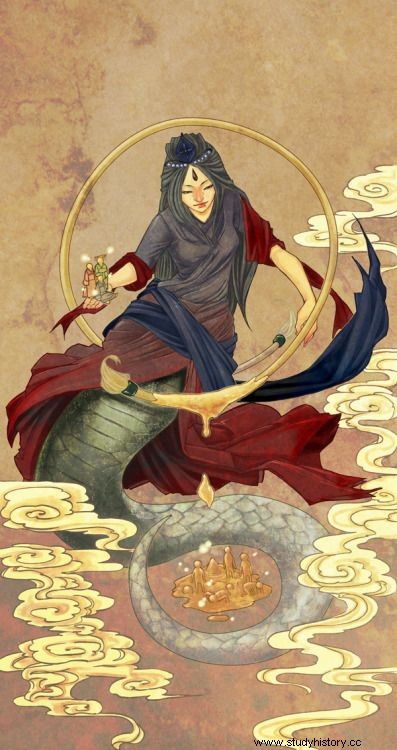
Nüwa, also known as Empress Wa, is legendary for her role as the creator of humanity. She is also involved in a number of other stories. However, she is best known for being the first human to breed and save humanity by closing a hole in the sky during a severe flood. There are two common variations of her story.
Humans made of clay
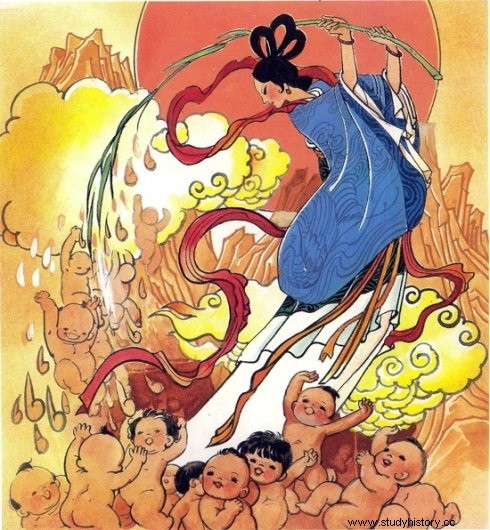
After Pangu created the universe, the earth became a beautiful place. Nüwa wanted to share this beauty, so she stopped along the banks of a river and began to make figures out of clay. She started small, making simple shapes like chickens and sheep. Sequentially, she decided to make figures that looked like her. She decided to call them humans. They pleased her so much that she created more until her hands hurt. Instead, she took a rope, dipped it in the water and swung it around so that many drops of mud formed around her. People say that those made by hand would be successful and high in status, while those formed by the rope became poor or the working class.
Marriage

In an alternative version of the myth, humanity has been wiped out by a flood. Nüwa and her brother, Fuxi, were the only survivors. They soon realized that they should multiply to keep humanity alive. However, they were deeply conflicted because they were siblings. Nüwa and Fuxi asked for heavenly guidance and underwent a divination test. This meant that the two would go to two separate mountains and light two separate bonfires. If the smoke blew straight up, they were not meant to get married. But if the traces of smoke crossed, it would mean that they were destined to be husband and wife. Consequently, they had passed the test, and then Nüwa and Fuxi married and repopulated the earth.
The hole in the sky
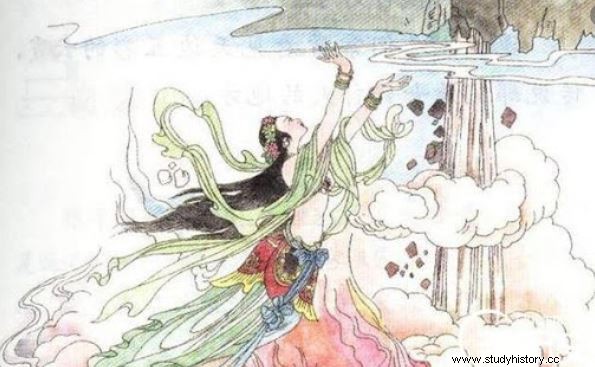
The earth was beautiful and populated, but still in its infancy when Gonggong, the water god, fought against Zhurong, the fire god. The battle was massive, forest fires raged and floods plagued the countryside - all to determine who was fit to be the ruler of heaven. When he lost, Gonggong became so furious that he smashed his head against one of the four pillars that held the sky up. The earth shook and the pillar collapsed and tore a hole in the sky as it fell. Water flowed endlessly from the hole and flooded the earth.
Nüwa could no longer bear to see her children suffer. So she went to the sky turtle, Ao, and asked for help. Then he cut off his own four legs to use as the new pillars. Nüwa melted five colored stones to close the hole in the sky. Then she replaced the broken pillars with Ao's legs, one by one, holding the sky up with her back.
Another version of the myth states that after she finished, she calmed down and died of exhaustion. Another version says that she realized that the stones would not be enough to seal the hole, so she sacrificed her body to seal the remaining part instead.
Nüwa had restored peace on earth. However, she was not able to adjust the heavens and the earth as they were before. Thus, the rivers in China today flow in a southeasterly direction.
Influence on pop culture
Although traditional religious beliefs have undergone massive changes, Nüwa is still seen as an important figure in popular culture. The people of China have dedicated many temples in China to Nüwa and Fuxi. However, her most eminent temple is located in Hebei Province. Individuals view the temple as an ancestral sanctuary for all people.
Some women even pray to Nüwa for help with marital problems and fertility problems.
The popular deity is even featured in a few video games. These include Smite, Arcane Legions, and Koei's Warriors Orochi 2, where she uses swords and shields.
Fuxi
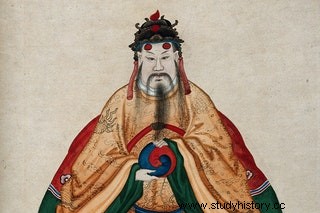
Fuxi is a powerful god who is considered to be mankind's first male ancestor. He is also China's first hero and invented the writing system, fishing and domestication of animals.
The invention of fishing and trapping
Fuxi and Nüwa cared deeply for humanity and would often help them when faced with significant difficulties. One day Fuxi noticed how hungry people were, as the hunt became increasingly difficult. He decided to help them by teaching them to catch fish with their hands. However, Dragon King - ruler of the seas, rivers and weather - was furious that they consumed his subjects. He was worried that if they continued to eat his subjects, he would not have anyone to rule. As a result, Dragon King declared a rule that humans are forbidden to catch fish with their hands.
Fuxi then tried another approach. He weaved a net made of wild reeds and taught people to catch the fish with the net instead.
Bagua or eight trigrams
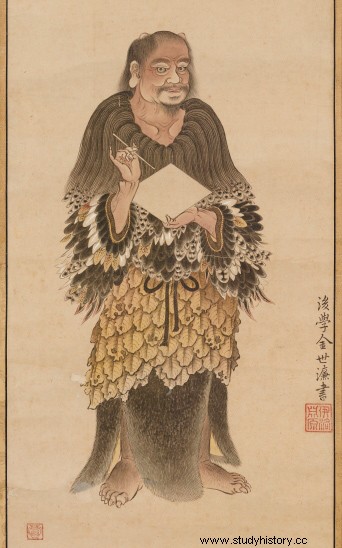
One of Fuxi's largest religious creations is the bagua or eight trigrams. The symbols consist of three broken or unbroken lines that represent the eight basic principles of reality. The bagua plays a major role in Chinese Buddhism and the practice of feng shui. Myth says that Fuxi was inspired to draw the eight trigrams after seeing the back of a turtle.
Domestic animal domesticationAmong his list of achievements and creations, Fuxi also created domestication of livestock. He believed that it was far more convenient to keep the animals for meat, milk and labor than to hunt every day. Fuxi also creates the writing system, invents currency, preserves meat and melts metals.
The Creation of Mankind
In some myths, Fuxi played a role in the creation of humans. In one version, Fuxi and his sister, Nüwa, marry and produce the human race through the association. In another version, however, he helped Nüwa create humanity from clay. People also believe that he helped her close the hole in the sky. In any case, his significance in history is not as strong as Nüwas'. This is because ancient Chinese society was largely matriarchal. People usually describe Fuxi as an "assistant" in stories about Nüwa.
Influence on pop culture
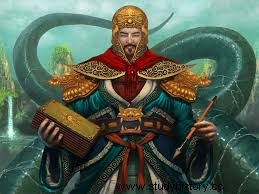
In honor of Fuxi, the people of China celebrate a month-long festival held from February 2 to March 3 in the lunar calendar at his temple in the city of Tianshui. On his birthday, the 16th th day of the lunar year, people from the neighboring provinces take the trip to light incense, pray and show respect for Fuxi. Some even encourage Fuxi when seeking better health, financial conditions or to thank their original ancestor.
Fuxi features in the Dynasty Warriors video games and Age of Mythology . In addition, in Warriors of Three Sovereigns , Marvel's first Sino-centric cartoon, a featured character uses a sword called "Fuxi Sword" and is the last descendant of Fuxi.
Cultural significance of the creation gods
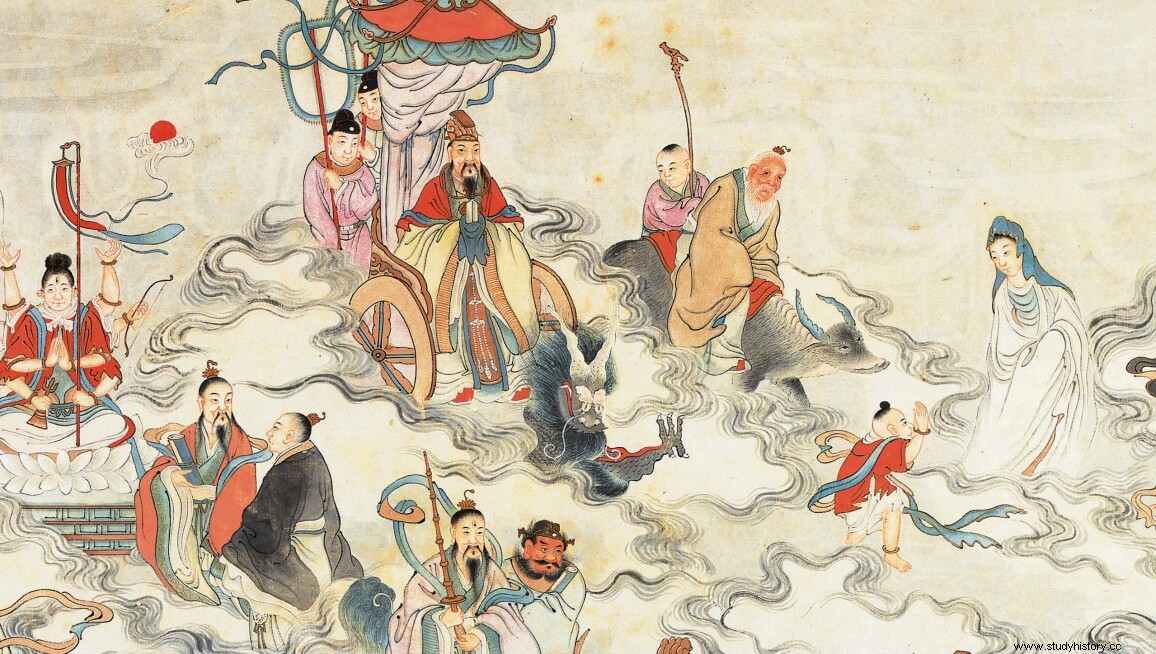
Chinese mythology has been a rich source of inspiration for many artists and writers for centuries. These Chinese gods continue to inspire a variety of works of art, such as drawings and illustrations, books, video games and movies, among many more. Furthermore, the creation gods influence social and religious practices that are still followed today. Civilians pray to the beloved gods regularly and have faith because of the obstacles these gods have overcome. The Chinese gods have shaped cultures and morals that individuals try their best to live up to even now. Their stories are also a great source of entertainment, as the nature of myths serves as a liberation for the human mind.
References
Chinese mythology. (2020, February 20). New World Encyclopedia,. Retrieved 16:26, 27 October 2021 from https://www.newworldencyclopedia.org/p/index.php?title=Chinese_mythology&oldid=1032655.
"Chinese mythology." U * X * L Encyclopedia of World Mythology. . Retrieved October 25, 2021, from Encyclopedia.com:https://www.encyclopedia.com/history/encyclopedias-almanacs-transcripts-and-maps/chinese-mythology
Hamilton, Mae. (nd). Pangu. Mythopedics. Retrieved from https://mythopedia.com/chinese-mythology/gods/pangu/
Hamilton, Mae. (nd). Nuwa. Mythopedics. Retrieved from https://mythopedia.com/chinese-mythology/gods/nuwa/
Hamilton, Mae. (nd). Fuxi. Mythopedics. Retrieved from https://mythopedia.com/chinese-mythology/gods/fuxi/
Leontovich, O. The world of Chinese fictional narratives:content, characters, and social impact. Int. Commun. Chin. Cult 2, 301–317 (2015). https://doi.org/10.1007/s40636-015-0026-x
